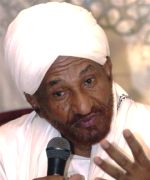Sudan ruling party trades accusations with opposition leader
By Wasil Ali
May 23, 2004 (KHARTOUM) — Leading figures from the ruling National Congress Party (NCP) traded fierce accusations with the main Sudanese opposition leader. They described a statement he made as “propaganda can be turning into a crime.”
 The deputy chairman of the NCP Nafi Ali Nafi branded the former Prime Minister Sadiq al-Mahdi as “selfish” and accused him of executing the hidden agendas of “Zionist lobbies and the radical Christian forces” in Sudan. Nafi hinted that al-Mahdi could be prosecuted for his statements saying it amounted to an “insinuation of a military coup”.
The deputy chairman of the NCP Nafi Ali Nafi branded the former Prime Minister Sadiq al-Mahdi as “selfish” and accused him of executing the hidden agendas of “Zionist lobbies and the radical Christian forces” in Sudan. Nafi hinted that al-Mahdi could be prosecuted for his statements saying it amounted to an “insinuation of a military coup”.
In an interview with the Arabic television network Al-Jazeera based in Qatar al-Mahdi slammed the government policies saying it created a dangerous situation in Sudan and opened the door for foreign intervention.
The former Prime Minister accused the Sudanese regime of corruption and challenged the Sudanese president Omar Hassan al-Bashir to prove any wrong doings on his part while in office during the years 1986-1989. He further said said that the NCP is deeply divided and could easily be defeated in the upcoming elections in 2009.
Nafi said that the threats issued by al-Mahdi “should be transferred to the concerned security and justice authorities”. He added that the objectives of defeating the NCP in the elections as outlined by al-Mahdi “can only be realized through military and not through democratic transformation and elections”.
The political affairs secretary of the NCP Mustafa Osman Ismail said that al-Mahdi “did not achieve any economical, political and social development in the period it was ruling the country”. He praised the achievements of the NCP saying it had specific plans “to develop the country in all fields”.
Al-Mahdi is one of the most outspoken critics against the Sudanese government. As a leader of the largest northern opposition parties he maintains a great deal of influence in the Sudanese political arena. Al-Mahdi has publicly supported the deployment of UN peacekeepers to the troubled western region of Darfur. He also supported the extradition of the two Darfur war suspects to the International Criminal Court.
(ST)
